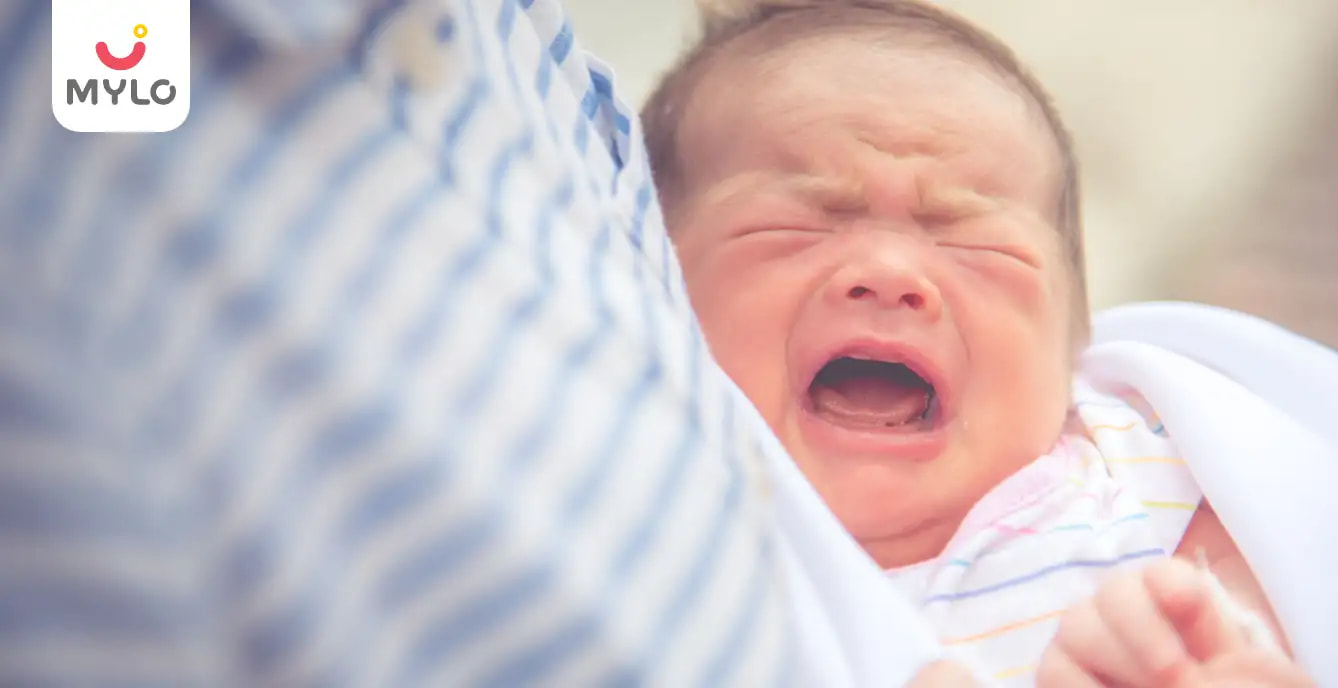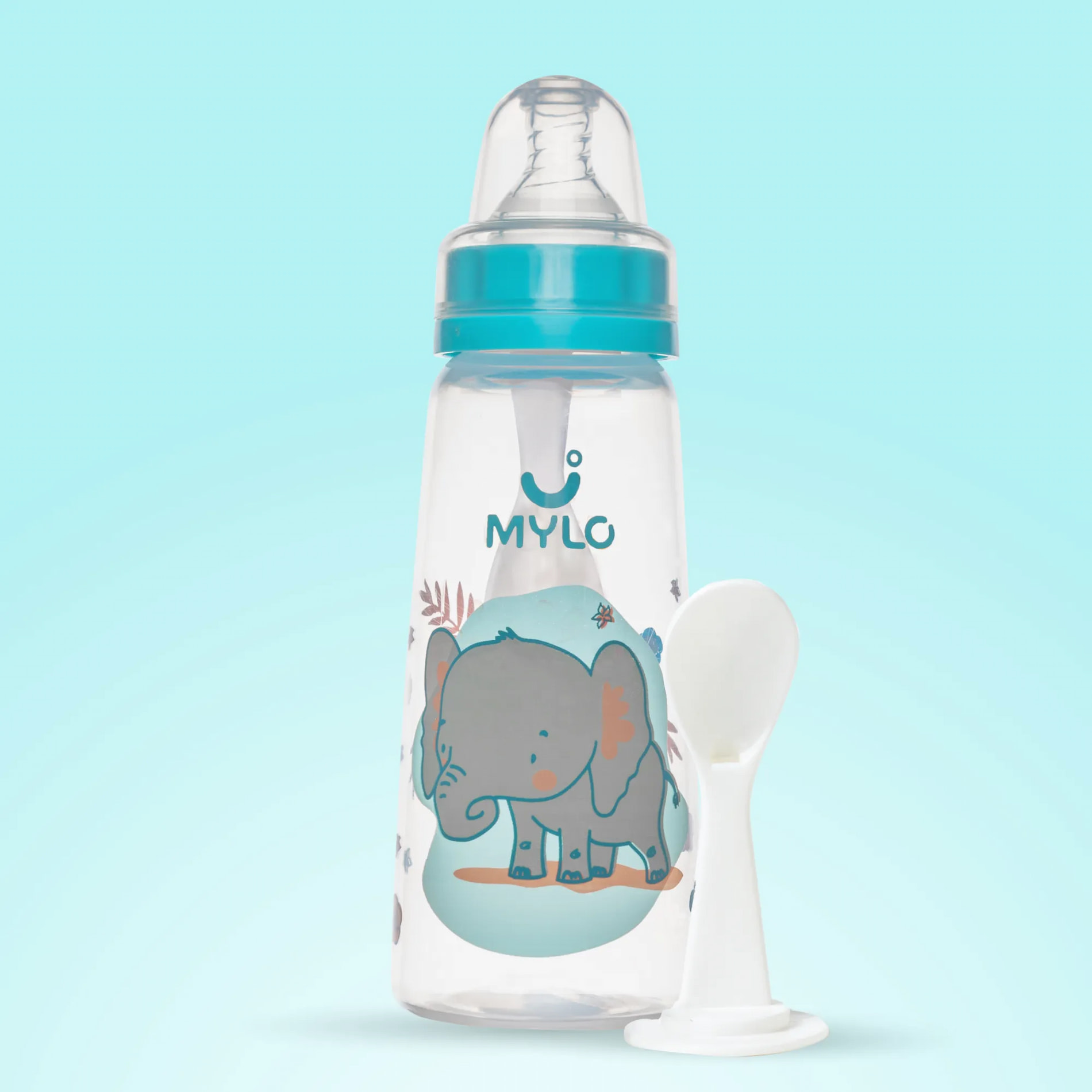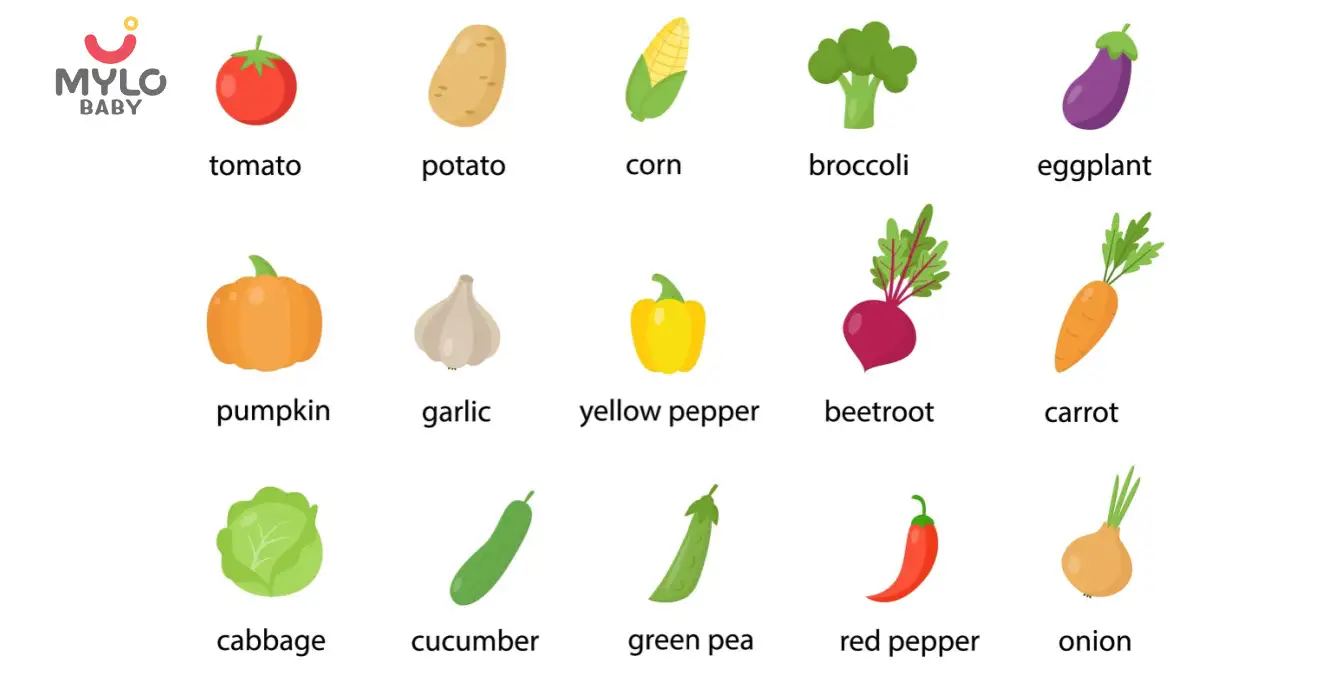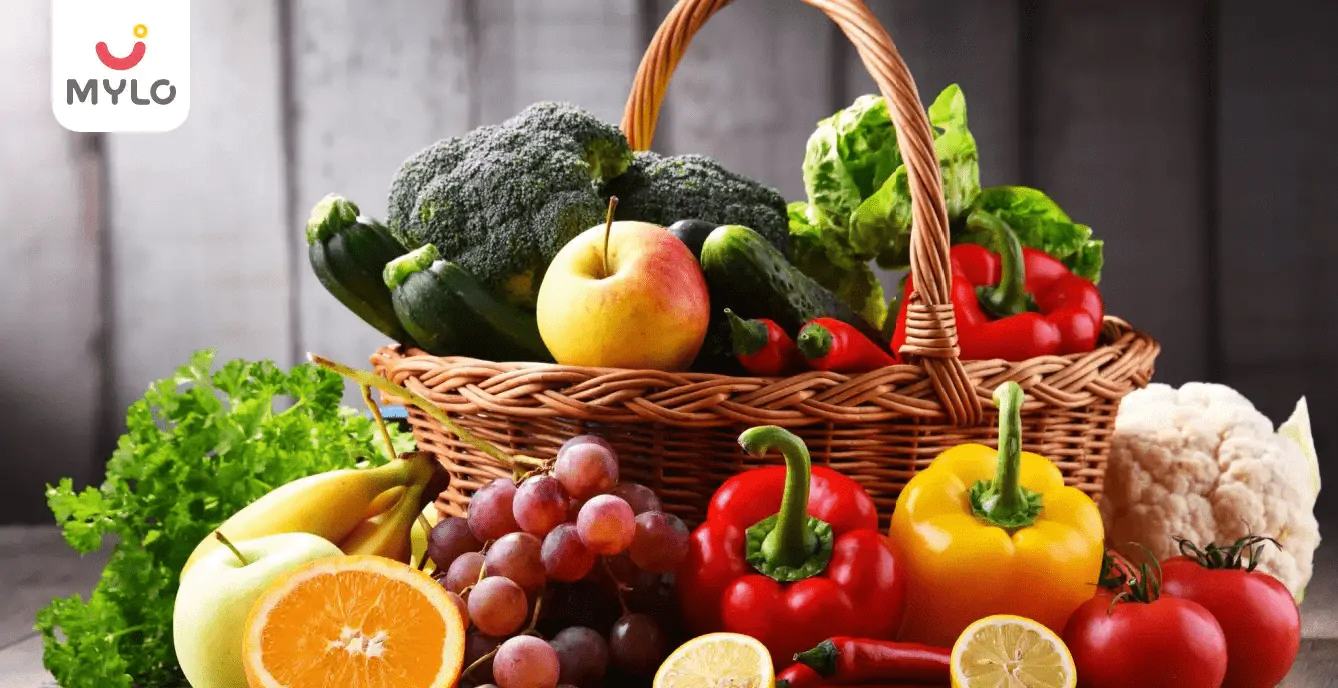Home

Breastfeeding & Lactation

Baby Not Drinking Milk: What Could Be the Possible Reasons and Solutions
In this Article

Breastfeeding & Lactation
Baby Not Drinking Milk: What Could Be the Possible Reasons and Solutions
Updated on 5 March 2024
As a doting parent who showered her love and attention on her little one, Preeti couldn’t help but notice that her baby girl, Anya had started showing signs of fussiness during feedings, turning away from the bottle and refusing to drink milk. After countless hours of research and conversations with pediatricians about baby not drinking milk, she came to realize that many parents encounter similar challenges when their baby refuses to drink milk.
So, whether you're a new parent like Preeti or an experienced caregiver, understanding the potential causes of baby not drinking milk from bottle and breast and learning effective strategies can make all the difference in ensuring our little ones receive the vital nourishment they need to thrive.
Possible Reasons for Baby Not Drinking Breast Milk
Breast milk is the ideal source of nutrition for newborns, providing them with essential nutrients and antibodies that support their immune system. However, there may be times when you may notice your baby not drinking breast milk and crying.
1. Nipple confusion
One possible reason for this could be nipple confusion. If a baby is introduced to a bottle too early, they may develop a preference for artificial nipples and struggle to latch onto the breast. In such cases, it is important to consult with a lactation consultant who can provide guidance on how to overcome this challenge.
2. Low milk supply
Another reason why a baby may not be drinking breast milk is due to an inadequate milk supply. This can occur when the mother is experiencing stress, fatigue, or is not breastfeeding frequently enough to stimulate milk production. Seeking support from a lactation consultant and increasing milk supply through techniques like pumping and breastfeeding on demand can help.
3. Teething
Babies may experience discomfort or pain while teething, which can make them reluctant to breastfeed. The pressure on their gums can make latching difficult and cause them to refuse to drink breast milk. Soothing their gums with a cold wash cloth or a nibbler can help ease the pain.
4. Changes in milk taste
Certain factors, such as medications, foods, or hormonal changes in the mother, can alter the taste of her breast milk. This change in taste might make the baby hesitant or refuse to drink breast milk. Eliminating responsible medications and foods and taking certain herbs can help remedy this situation.
5. Illness or infections
Babies with conditions like ear infections, colds, or thrush may find it uncomfortable to breastfeed due to pain or discomfort. This can lead to a refusal to drink breast milk. Addressing the underlying problem can help mothers and babies overcome this roadblock.
6. Distraction
Older babies are easily distracted by their surroundings, which can make them lose interest in breastfeeding. They may refuse to nurse if there are interesting noises, objects, or people around. As a result, it’s important to minimise the distractions around your baby.
7. Impatience or slow letdown
Some babies prefer a faster milk flow and may become frustrated if the letdown is slow. This impatience can result in a refusal to drink breast milk. A breast massage, using a breast pump, drinking water or tea and nursing while lying down may help improve milk flow.
Possible Reasons for Baby Not Drinking Milk from Bottle
If you notice your baby not drinking milk from bottle suddenly, it can be frustrating for parents who rely on this method for feeding.
1. Preference for breastfeeding
One possible reason for this behavior is nipple preference. If a baby is used to breastfeeding, they may struggle with the transition to a bottle due to the difference in nipple shape and flow. It can be helpful to experiment with different bottle nipples, finding one that closely resembles the shape and feel of the mother's nipple.
2. Desire for different nipple flow
Babies may become accustomed to a specific nipple flow from breastfeeding and may not accept a different flow from a bottle. If the flow is too slow or too fast, they may reject the bottle and refuse to drink from it. It’s important to choose a bottle with the right milk flow according to your baby’s preferences.
3. Fullness from solid food
As babies start introducing solid foods into their diet, they may feel full and less inclined to drink milk from a bottle. This can lead to a decrease in their milk intake, resulting in a refusal to drink from the bottle.
4. Discomfort or pain
Another reason why a baby may not be drinking milk from a bottle suddenly is discomfort or pain. Babies may experience ear infections, teething, or other oral issues that make sucking on a bottle painful. If you suspect this to be the case, it is important to consult with a pediatrician who can diagnose and treat any underlying issues.
5. Distractions
Babies can easily get distracted by their surroundings, especially as they grow older and become more aware of their environment. If there are too many distractions around them, they may refuse to drink milk from a bottle and prefer to explore their surroundings instead.
6. Temperature of milk
If the temperature of the milk in the feeding bottle is too hot or cold, then also your baby might refuse to drink milk from it. Ensuring that the temperature of the milk is appropriate and offering the bottle in a calm and comfortable environment can also encourage a baby to drink from a bottle.
Baby Not Drinking Milk: When to Worry
While it is common for babies to go through phases where they are less interested in drinking milk, there are certain signs that may indicate a need for medical attention such as:
-
Baby consistently refuses to drink milk for an extended period of time
-
Signs of dehydration such as decreased urine output or dry mouth
-
Sudden change in behavior or appetite
-
Experiences weight loss
In case, you notice the above signs, it is important to consult with a healthcare professional. They can assess your baby's overall health and provide appropriate recommendations and treatment if necessary.
You may also like: Baby Sleeping While Breastfeeding: Understanding the Causes and Solutions
What to Do If Baby is Not Drinking Breast Milk?
If your baby is not drinking milk, there are several strategies that can help encourage them to do so such as:
1. Firstly, it is important to create a calm and comfortable feeding environment. Minimize distractions and noise, and ensure that both you and your baby are relaxed.
2. Offering the milk in a familiar and soothing position, such as cradling them in your arms, can also help promote a positive feeding experience.
3. Experimenting with different feeding positions can also make a difference. Some babies may prefer to be held upright or at a slight incline while drinking milk, while others may find comfort in a more reclined position.
4. Introducing a bottle or breast nipple that closely resembles the mother's nipple can also encourage a baby who is refusing to drink milk. These nipples often mimic the shape and texture of the breast, making it easier for babies to transition between breast and bottle.
If you’re looking for such a bottle, then you may consider checking out Mylo’s BPA-free, anti-colic feeding bottles with grooved, breast-like nipples that facilitate easy transition and feeding.
FAQs
1. What to do if baby not drinking breast milk and crying?
If your baby is not drinking breast milk and is crying, check for signs of discomfort or illness, such as fever, irritability, or excessive crying. If you suspect that your baby is unwell, it is important to seek medical attention.
2. Why is my baby not drinking milk from bottle suddenly?
It could be due to a change in nipple preference, discomfort or pain while sucking, or a dislike of the taste or temperature of the milk.
3. How to find the best bottle for breastfed baby who refuses bottle?
Look for bottles with nipples that closely resemble the shape and texture of the mother's nipple. There are also bottles specifically designed for breastfed babies that mimic the natural flow and feel of breastfeeding.
The Bottomline
If your baby is not drinking milk, whether it be breast milk or milk from a bottle, it is important to identify the possible reasons behind their behavior and take appropriate steps to encourage them. Nipple confusion, inadequate milk supply, nipple preference, discomfort, or other factors may contribute to a baby not drinking milk. By seeking support from healthcare professionals, experimenting with different feeding positions and nipples, and creating a calm and comfortable feeding environment, you can help ensure your baby receives the nutrition they need for healthy growth and development.
References
1. Jalali F, Kamiab Z, Khademalhosseini M, Daeizadeh F, Bazmandegan G. (2021). Nursing strikes among infants and its affecting factors in Rafsanjan city. J Med Life.
2. Nayyeri F, Raji F, Haghnazarian E, Shariat M, Dalili H. (2015). Frequency of "Nursing Strike" among 6-Month-Old Infants, at East Tehran Health Center and Contributing Factors. J Family Reprod Health.

2-in-1 Baby Feeding Bottle (Elephant) - 250 ml
BPA Free with Anti-Colic Nipple & Spoon | Feels Natural Baby Bottle | Easy Flow Neck Design
₹ 171

4.3
(8715)


4201 Users bought



Written by
Anupama Chadha
Anupama Chadha, born and raised in Delhi is a content writer who has written extensively for industries such as HR, Healthcare, Finance, Retail and Tech.
Read MoreGet baby's diet chart, and growth tips

Related Articles
Related Topics
RECENTLY PUBLISHED ARTICLES
our most recent articles

Festivals & Celebrations
The Ultimate Collection of International Women's Day Quotes

Education
The A-Z Guide to Identifying Vegetables Name in English for Children

Pregnancy Best Foods
Grapes in Pregnancy: The Ultimate Guide to Benefits & Precautions

Postpartum Exercise: What to Know About Exercising After Pregnancy
Growth & Development
Baby Crawling: A Parent's Guide to Baby's First Moves

Weight Loss
Postpartum Diet Plan: Your Postpartum Nutrition Guide
- The Ultimate Guide to Crafting the Perfect Baby Photoshoot
- Lupride Injection: How It Works and What You Need to Know
- Why are Some Women Recommended HCG Injection During Pregnancy?
- Sudden Infant Death Syndrome (SIDS): Meaning, Causes & Prevention
- Period After Abortion: What to Expect About Timing, Duration and Frequency
- Thumb Sucking: How to Help Your Child Break the Habit
- The Ultimate Guide on How to Shrink Ovarian Cysts Naturally
- Ashwagandha Benefits for Female & Male Fertility: How This Ancient Herb Can Help You Conceive
- What are the 12 things that parents can do with their baby in the first 12 months?
- The Lowdown on Cetirizine in Pregnancy: A Must-Read for Expecting Moms
- The Ultimate Collection of Paheliyan with Answer for Kids
- The Ultimate Guide to Abdominal Pain After Abortion Causes and Care
- Ovulation Kit 101: A Beginner's Guide to Tracking Fertility & Maximizing Your Chances of Conception
- Is Breast Pain after Abortion Normal? What You Need to Know


AWARDS AND RECOGNITION

Mylo wins Forbes D2C Disruptor award

Mylo wins The Economic Times Promising Brands 2022
AS SEEN IN

- Mylo Care: Effective and science-backed personal care and wellness solutions for a joyful you.
- Mylo Baby: Science-backed, gentle and effective personal care & hygiene range for your little one.
- Mylo Community: Trusted and empathetic community of 10mn+ parents and experts.
Product Categories
baby carrier | baby soap | baby wipes | stretch marks cream | baby cream | baby shampoo | baby massage oil | baby hair oil | stretch marks oil | baby body wash | baby powder | baby lotion | diaper rash cream | newborn diapers | teether | baby kajal | baby diapers | cloth diapers |




